Campus/People
-
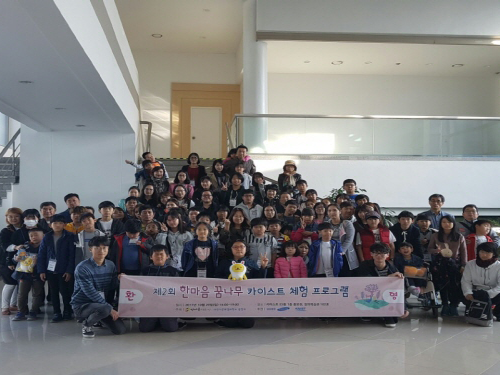 Hanmaeum Education Corps Invites Multicultural Families
About 100 graduates from the Multicultural Mother Schools and their families visited the KAIST campus on October 29 at the invitation of the Hanmaeum Education Corps of KAIST. The Hanmanum Education Corps is a volunteering organization composed of KAIST faculty and students. Many retired KAIST faculties are also members of the corps. Byong Kyu Choi, an Emeritus Professor from the Department of Industrial and Systems Engineering, is the director of the corps and has been leading the event since 2015.
With the support of a KAIST educational volunteering organization called SEED(Social Education Embracing Diversity), this year’s event offered various activities including a treasure hunt and convergent science programs. Participants had the opportunity to experience KAIST’s educational environment and enjoyed the perfect autumn weather during outdoor activities with student volunteers.
Children enjoyed making illumination-music stickers with the KAIST students, even though it was tough to learn at first.
While the children engaged themselves in the science program, parents visited the chrysanthemum fair and some of KAIST’s cafeterias.
Hanmaeum Education Corps opened the Multicultural Mother Schools to support multicultural mothers so that they can have more interest in and help their children more with their education. Since its establishment in 2015, the Multicultural Mother Schools have been expanding throughout the country.
The corporation hopes that visiting a renowned university will encourage children from multicultural families to study hard in addition to offering self-enrichment opportunities through career exploration and science activities.
2017.10.30 View 5419
Hanmaeum Education Corps Invites Multicultural Families
About 100 graduates from the Multicultural Mother Schools and their families visited the KAIST campus on October 29 at the invitation of the Hanmaeum Education Corps of KAIST. The Hanmanum Education Corps is a volunteering organization composed of KAIST faculty and students. Many retired KAIST faculties are also members of the corps. Byong Kyu Choi, an Emeritus Professor from the Department of Industrial and Systems Engineering, is the director of the corps and has been leading the event since 2015.
With the support of a KAIST educational volunteering organization called SEED(Social Education Embracing Diversity), this year’s event offered various activities including a treasure hunt and convergent science programs. Participants had the opportunity to experience KAIST’s educational environment and enjoyed the perfect autumn weather during outdoor activities with student volunteers.
Children enjoyed making illumination-music stickers with the KAIST students, even though it was tough to learn at first.
While the children engaged themselves in the science program, parents visited the chrysanthemum fair and some of KAIST’s cafeterias.
Hanmaeum Education Corps opened the Multicultural Mother Schools to support multicultural mothers so that they can have more interest in and help their children more with their education. Since its establishment in 2015, the Multicultural Mother Schools have been expanding throughout the country.
The corporation hopes that visiting a renowned university will encourage children from multicultural families to study hard in addition to offering self-enrichment opportunities through career exploration and science activities.
2017.10.30 View 5419 -
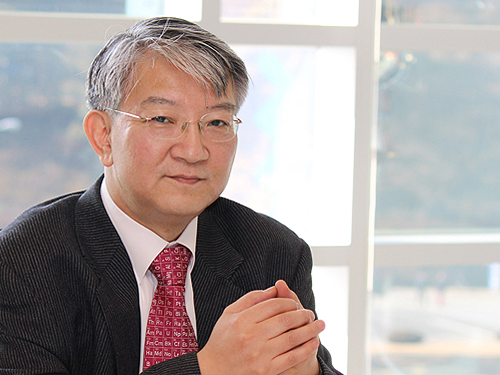 Distinguished Professor Lee Named International Fellow of the CAS
Distinguished Professor Sang Yup Lee from the Department of Chemical and Biomolecular Engineering at KAIST was awarded the title of distinguished professor and international fellow from the Chinese Academy of Sciences (CAS), and honorary professor from its affiliated organization the Tianjin Institute of Industrial Biotechnology (TIB).
The CAS recognized Distinguished Professor Lee for his significant contributions to biotechnology. He has made significant pioneering academic achievements in the area of systems metabolic engineering, which produces useful chemicals from microorganisms. Not only did he develop the first and best source technology in that field, but also came out with processes for the production of biofuel and environmentally-friendly chemicals.”
As a global leader in systems metabolic engineering, Distinguished Professor Lee has also been appointed as an honorary professor at Jiangnan University in Wuxi, China.
Distinguished Professor Lee was listed in the ‘Top 20 Translational Researchers of 2014’ selected by the renowned international journal Nature Biotechnology. Moreover, he was the first Asian recipient of the James E. Bailey Award in 2016 and Marvin J. Johnson Award in 2012, which are given to scholars in the field of biotechnology.
He is also one of 13 global scientists who are foreign members of the renowned academic societies the National Academy of Engineering and the National Academy of Sciences in the US. Furthermore, he received the ‘2017 Korea Best Scientist Award’ from the president of Korea in July. Finally, his founding field, systems metabolic engineering, was chosen as one of the ‘Top 10 Emerging Technologies of 2016’ by the World Economic Forum.
The Chinese Academy of Sciences, established in November 1949, is an academic organization that carries out research on basic sciences and natural sciences in China. It defined its science and technology system to include the fields of basic sciences, natural sciences, and high technology. While having a base in Beijing, its branch academies are located in 12 main cities along with 117 affiliates and 100 national key labs.
2017.10.26 View 12309
Distinguished Professor Lee Named International Fellow of the CAS
Distinguished Professor Sang Yup Lee from the Department of Chemical and Biomolecular Engineering at KAIST was awarded the title of distinguished professor and international fellow from the Chinese Academy of Sciences (CAS), and honorary professor from its affiliated organization the Tianjin Institute of Industrial Biotechnology (TIB).
The CAS recognized Distinguished Professor Lee for his significant contributions to biotechnology. He has made significant pioneering academic achievements in the area of systems metabolic engineering, which produces useful chemicals from microorganisms. Not only did he develop the first and best source technology in that field, but also came out with processes for the production of biofuel and environmentally-friendly chemicals.”
As a global leader in systems metabolic engineering, Distinguished Professor Lee has also been appointed as an honorary professor at Jiangnan University in Wuxi, China.
Distinguished Professor Lee was listed in the ‘Top 20 Translational Researchers of 2014’ selected by the renowned international journal Nature Biotechnology. Moreover, he was the first Asian recipient of the James E. Bailey Award in 2016 and Marvin J. Johnson Award in 2012, which are given to scholars in the field of biotechnology.
He is also one of 13 global scientists who are foreign members of the renowned academic societies the National Academy of Engineering and the National Academy of Sciences in the US. Furthermore, he received the ‘2017 Korea Best Scientist Award’ from the president of Korea in July. Finally, his founding field, systems metabolic engineering, was chosen as one of the ‘Top 10 Emerging Technologies of 2016’ by the World Economic Forum.
The Chinese Academy of Sciences, established in November 1949, is an academic organization that carries out research on basic sciences and natural sciences in China. It defined its science and technology system to include the fields of basic sciences, natural sciences, and high technology. While having a base in Beijing, its branch academies are located in 12 main cities along with 117 affiliates and 100 national key labs.
2017.10.26 View 12309 -
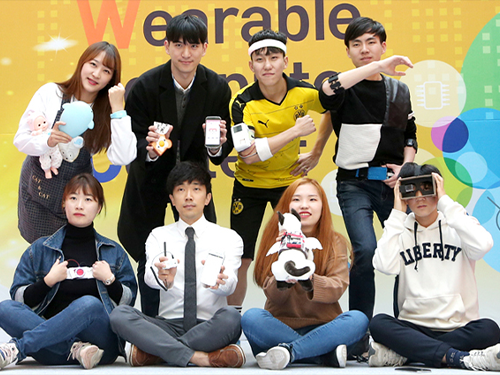 KAIST to Host the Wearable Computer Contest
KAIST is hosting the ‘Wearable Computer Contest (WCC) 2017’ as a part of the Daejeon Science Festival from October 21 to 24 at Expo Park. This is the 13th contest in which college students can manufacture wearable computers on their own by combining their innovative ideas with state-of-art technology.
The total of 60 teams will participate in the contest. The winning team will receive a prize from the Minister of ICT and Science with a 3,000,000 won cash prize. ‘Wearable computers’ are devices worn on clothing so that users can have easier access to a computer. Recently, devices linked to smart phones are drawing significant attention because they allow users to conveniently experience various internet-based services.
“More recently, industries have shown a great interest in Artificial Intelligence as well as wearable computers. The Wearable Computer Contest will play a leading role in discovering talented people for the preparation of the Fourth Industrial Revolution,” said Professor Hoi-Jun Yoo from the School of Electrical Engineering, KAIST as well as the committee president of the WCC. “Daejeon will become a hub that encourages youths’ creativity for developing future technology,” he added.
With the mission of using Virtual Reality, this contest will showcase creative entries that applied VR devices. For more information about the contest, please visit the event website at http://www.ufcom.org.
2017.10.20 View 5061
KAIST to Host the Wearable Computer Contest
KAIST is hosting the ‘Wearable Computer Contest (WCC) 2017’ as a part of the Daejeon Science Festival from October 21 to 24 at Expo Park. This is the 13th contest in which college students can manufacture wearable computers on their own by combining their innovative ideas with state-of-art technology.
The total of 60 teams will participate in the contest. The winning team will receive a prize from the Minister of ICT and Science with a 3,000,000 won cash prize. ‘Wearable computers’ are devices worn on clothing so that users can have easier access to a computer. Recently, devices linked to smart phones are drawing significant attention because they allow users to conveniently experience various internet-based services.
“More recently, industries have shown a great interest in Artificial Intelligence as well as wearable computers. The Wearable Computer Contest will play a leading role in discovering talented people for the preparation of the Fourth Industrial Revolution,” said Professor Hoi-Jun Yoo from the School of Electrical Engineering, KAIST as well as the committee president of the WCC. “Daejeon will become a hub that encourages youths’ creativity for developing future technology,” he added.
With the mission of using Virtual Reality, this contest will showcase creative entries that applied VR devices. For more information about the contest, please visit the event website at http://www.ufcom.org.
2017.10.20 View 5061 -
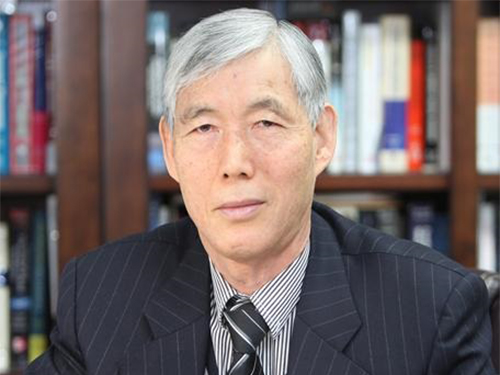 Professor Dai Gil Lee Recognized by the ICCS
Emeritus Professor Dai Gil Lee, from the School of Mechanical and Aerospace Engineering at KAIST, received a special achievement award from the 20th International Conference on Composite Structures (ICCS).
ICCS is a renowned conference in the field of applied composite structures, which highlights the practicality of composite structures. This year, the conference was held at the Conservatoire National des Arts et Métiers (CNAM), Paris, France from September 4 to 7. Approximately 650 papers were presented from 45 countries.
Especially, the conference honored Emeritus Professor Lee, who has been engaged in ICCS since 1993 and received best paper award twice. The ICCS recognized him for serving with distinction in science and technology in the fields of composite materials and structures. As a member of the Editorial Board for many years, he gave significant support to the journal Composite Structures. At the conference, he gave a special lecture titled ‘Lightweight Carbon Composite Proton Exchange Membrane Fuel Cells’.
Professor Lee said, “I will dedicate myself to innovate Vanadium Redox Flow Battery-ESS (VRFB) based on the research findings announced at the conference and related patents. I am hoping that these efforts will contribute to solving energy issues around the world.”
2017.10.19 View 8533
Professor Dai Gil Lee Recognized by the ICCS
Emeritus Professor Dai Gil Lee, from the School of Mechanical and Aerospace Engineering at KAIST, received a special achievement award from the 20th International Conference on Composite Structures (ICCS).
ICCS is a renowned conference in the field of applied composite structures, which highlights the practicality of composite structures. This year, the conference was held at the Conservatoire National des Arts et Métiers (CNAM), Paris, France from September 4 to 7. Approximately 650 papers were presented from 45 countries.
Especially, the conference honored Emeritus Professor Lee, who has been engaged in ICCS since 1993 and received best paper award twice. The ICCS recognized him for serving with distinction in science and technology in the fields of composite materials and structures. As a member of the Editorial Board for many years, he gave significant support to the journal Composite Structures. At the conference, he gave a special lecture titled ‘Lightweight Carbon Composite Proton Exchange Membrane Fuel Cells’.
Professor Lee said, “I will dedicate myself to innovate Vanadium Redox Flow Battery-ESS (VRFB) based on the research findings announced at the conference and related patents. I am hoping that these efforts will contribute to solving energy issues around the world.”
2017.10.19 View 8533 -
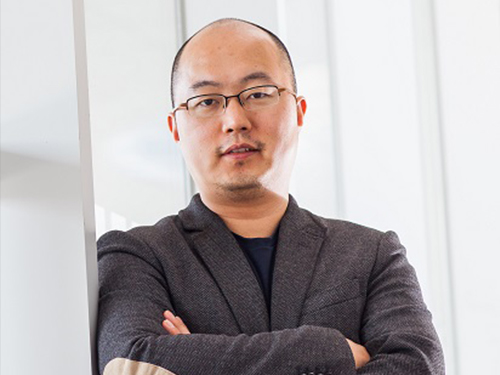 Professor YongKeun Park Elected as a Fellow of the Optical Society
Professor YongKeun Park, from the Department of Physics at KAIST, was elected as a fellow member of the Optical Society (OSA) in Washington, D.C. on September 12. Fellow membership is given to members who have made a significant contribution to the advancement of optics and photonics.
Professor Park was recognized for his research on digital holography and wavefront control technology.
Professor Park has been producing outstanding research outcomes in the field of holographic technology and light scattering control since joining KAIST in 2010. In particular, he developed and commercialized technology for a holographic telescope. He applied it to various medical and biological research projects, leading the field worldwide.
In the past, cells needed to be dyed with fluorescent materials to capture a 3-D image. However, Professor Park’s holotomography (HT) technology can capture 3-D images of living cells and tissues in real time without color dyeing. This technology allows diversified research in the biological and medical field.
Professor Park established a company, Tomocube, Inc. in 2015 to commercialize the technology. In 2016, he received funding from SoftBank Ventures and Hanmi Pharmaceutical. Currently, major institutes, including MIT, the University of Pittsburgh, the German Cancer Research Center, and Seoul National University Hospital are using his equipment.
Recently, Professor Park and his team developed technology based on light scattering measurements. With this technology, they established a company called The Wave Talk and received funding from various organizations, such as NAVER. Its first product is about to be released.
Professor Park said, “I am glad to become a fellow member based on the research outcomes I produced since I was appointed as a professor at KAIST. I would like to thank the excellent researchers as well as the school for its support. I will devote myself to continuously producing novel outcomes in both basic and applied fields.”
Professor Park has published nearly 100 papers in renowned journals including Nature Photonics, Nature Communications, Science Advances, and Physical Review Letters.
2017.10.18 View 12773
Professor YongKeun Park Elected as a Fellow of the Optical Society
Professor YongKeun Park, from the Department of Physics at KAIST, was elected as a fellow member of the Optical Society (OSA) in Washington, D.C. on September 12. Fellow membership is given to members who have made a significant contribution to the advancement of optics and photonics.
Professor Park was recognized for his research on digital holography and wavefront control technology.
Professor Park has been producing outstanding research outcomes in the field of holographic technology and light scattering control since joining KAIST in 2010. In particular, he developed and commercialized technology for a holographic telescope. He applied it to various medical and biological research projects, leading the field worldwide.
In the past, cells needed to be dyed with fluorescent materials to capture a 3-D image. However, Professor Park’s holotomography (HT) technology can capture 3-D images of living cells and tissues in real time without color dyeing. This technology allows diversified research in the biological and medical field.
Professor Park established a company, Tomocube, Inc. in 2015 to commercialize the technology. In 2016, he received funding from SoftBank Ventures and Hanmi Pharmaceutical. Currently, major institutes, including MIT, the University of Pittsburgh, the German Cancer Research Center, and Seoul National University Hospital are using his equipment.
Recently, Professor Park and his team developed technology based on light scattering measurements. With this technology, they established a company called The Wave Talk and received funding from various organizations, such as NAVER. Its first product is about to be released.
Professor Park said, “I am glad to become a fellow member based on the research outcomes I produced since I was appointed as a professor at KAIST. I would like to thank the excellent researchers as well as the school for its support. I will devote myself to continuously producing novel outcomes in both basic and applied fields.”
Professor Park has published nearly 100 papers in renowned journals including Nature Photonics, Nature Communications, Science Advances, and Physical Review Letters.
2017.10.18 View 12773 -
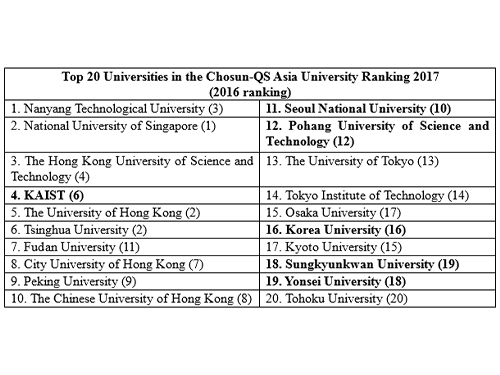 KAIST Ranked Fourth in the Chosun-QS Asia University Ranking 2017
KAIST ranked fourth in the ‘Chosun-QS Asia University Ranking 2017’, which is top among universities in Korea for four consecutive years. Particularly, KAIST jumped two places compared to last year’s ranking due to achieving higher scores in two indicators; the number of papers per faculty and citations per paper.
Out of 426 universities, 47 universities in Korea were included on the list, and six of them landed in top 20. It is important to note that only two Korean universities improved their ranking: KAIST and Sungkyunkwan University.
2017.10.18 View 2839
KAIST Ranked Fourth in the Chosun-QS Asia University Ranking 2017
KAIST ranked fourth in the ‘Chosun-QS Asia University Ranking 2017’, which is top among universities in Korea for four consecutive years. Particularly, KAIST jumped two places compared to last year’s ranking due to achieving higher scores in two indicators; the number of papers per faculty and citations per paper.
Out of 426 universities, 47 universities in Korea were included on the list, and six of them landed in top 20. It is important to note that only two Korean universities improved their ranking: KAIST and Sungkyunkwan University.
2017.10.18 View 2839 -
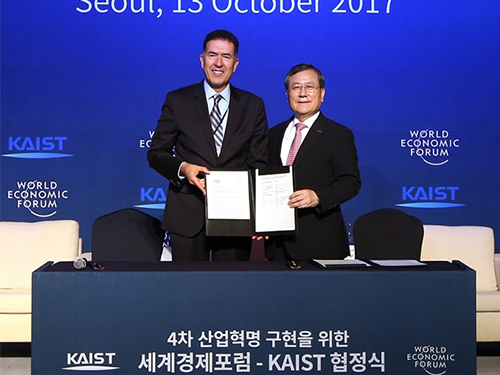 KAIST Partners with WEF to Prepare for the 4th Industrial Revolution
KAIST President Sung-Chul Shin and the Head of the World Economic Forum Center for the Fourth Industrial Revolution, Murat Sonmez, made a commitment to build cooperation in an active manner for addressing the ramifications of the Fourth Industrial Revolution.
The two signed an MOU to cooperate in research in related fields on October 13 after holding a roundtable discussion titled “The Future of Jobs and Inclusive Growth in Korea”. It is the first partnership that the WEF has sealed with an academic institution.The roundtable discussion brought together distinguished guests from politics, non-profit civic organizations, academia, and enterprises including Daejeon Mayor Seon-Taek Kwon, Doosan Group Vice Chairman Lee Hyun-Soon, and Korean Venture Business Association President Ahn Keon-Joon.
During the news conference, President Shin said, “This event means a lot because it explores ways in which inclusive growth and job creation can be realized in Korea. To move forward in the new age of the Fourth Industrial Revolution, every country needs to adopt appropriate new policies suitable for their specific market environments. KAIST will contribute to this process for Korea as well as for the global community.”
President Shin also said, “Korea has been a fast follower in previous industrial revolutions. Now, we have the momentum to seize the opportunities in the wake of this revolution. KAIST is dedicated to leading Korea into becoming a first mover in the Fourth Industrial Revolution by cooperating with the WEF.”
“Two decades later, we will live with considerable number of robots around us. It is possible that our societies in the future will consist of Homo sapiens and Robo sapiens. We need to create new jobs for Homo sapiens to prepare for a society that we will have to coexist with a new industrial tribe. Industries need continuing education to retrain workers for the ever evolving industrial landscape of the future,” President Shin emphasized.
Meanwhile, Sonmez pointed out that all stakeholders should participate in understanding the new industrial environment’s ramifications, saying “Societies, governments, public and private sectors, startups, and academia should co-design inclusive models through global efforts. Ethics and influences on the job market should also be taken into consideration.”
Sonmez said nine factors such as blockchains, internet of things, artificial intelligence, machine learning, cross-border data blow, drones, 3D printing, autonomous driving, the environment, and precision medicine will take center stage in the Fourth Industrial Revolution, In particular, he said that blockchains, which are a cybersecurity technology for online financial transactions, will bring even bigger changes than the ‘World Wide Web’ has done over the past three decades.
“To this end, we will have to work closely with major academic institutes. Through this partnership with KAIST, we will make the fruits of the new industrial environment benefit Koreans and Korean society,” Sonmez added.
2017.10.14 View 9268
KAIST Partners with WEF to Prepare for the 4th Industrial Revolution
KAIST President Sung-Chul Shin and the Head of the World Economic Forum Center for the Fourth Industrial Revolution, Murat Sonmez, made a commitment to build cooperation in an active manner for addressing the ramifications of the Fourth Industrial Revolution.
The two signed an MOU to cooperate in research in related fields on October 13 after holding a roundtable discussion titled “The Future of Jobs and Inclusive Growth in Korea”. It is the first partnership that the WEF has sealed with an academic institution.The roundtable discussion brought together distinguished guests from politics, non-profit civic organizations, academia, and enterprises including Daejeon Mayor Seon-Taek Kwon, Doosan Group Vice Chairman Lee Hyun-Soon, and Korean Venture Business Association President Ahn Keon-Joon.
During the news conference, President Shin said, “This event means a lot because it explores ways in which inclusive growth and job creation can be realized in Korea. To move forward in the new age of the Fourth Industrial Revolution, every country needs to adopt appropriate new policies suitable for their specific market environments. KAIST will contribute to this process for Korea as well as for the global community.”
President Shin also said, “Korea has been a fast follower in previous industrial revolutions. Now, we have the momentum to seize the opportunities in the wake of this revolution. KAIST is dedicated to leading Korea into becoming a first mover in the Fourth Industrial Revolution by cooperating with the WEF.”
“Two decades later, we will live with considerable number of robots around us. It is possible that our societies in the future will consist of Homo sapiens and Robo sapiens. We need to create new jobs for Homo sapiens to prepare for a society that we will have to coexist with a new industrial tribe. Industries need continuing education to retrain workers for the ever evolving industrial landscape of the future,” President Shin emphasized.
Meanwhile, Sonmez pointed out that all stakeholders should participate in understanding the new industrial environment’s ramifications, saying “Societies, governments, public and private sectors, startups, and academia should co-design inclusive models through global efforts. Ethics and influences on the job market should also be taken into consideration.”
Sonmez said nine factors such as blockchains, internet of things, artificial intelligence, machine learning, cross-border data blow, drones, 3D printing, autonomous driving, the environment, and precision medicine will take center stage in the Fourth Industrial Revolution, In particular, he said that blockchains, which are a cybersecurity technology for online financial transactions, will bring even bigger changes than the ‘World Wide Web’ has done over the past three decades.
“To this end, we will have to work closely with major academic institutes. Through this partnership with KAIST, we will make the fruits of the new industrial environment benefit Koreans and Korean society,” Sonmez added.
2017.10.14 View 9268 -
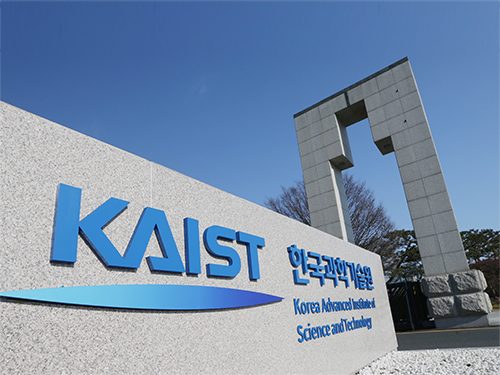 KAIST Ranked as the World's Sixth Most Innovative University for Two Consecutive Years
KAIST ranked sixth in The Reuters Top 100: The World’s Most Innovative Universities 2017 for the second consecutive year, and is the top among Asian universities.
Compared with last year’s data, KAIST improved its commercial impact as well as total patents filed; the commercial impact increased from 91.2 to 91.7 while the total patents filed was boosted from 911 to 923.
Only two Asian universities placed in the top 20, including KAIST. As a result of continuously producing top quality innovative research, KAIST was able to keep the highest ranking outside the United States.
Since 2015, The Reuters Top 100: The World’s Most Innovative Universities evaluates and ranks the most innovative educational institutions based on ten indicators including patent volume, citations, and impact. Except for patent citation impact and percentage of patents cited, the remaining indicators are equally weighted and added up for the final score.
Click to find a full article ☞ Reuters Top 100: The World’s Most Innovative Universities - 2017
2017.09.29 View 4237
KAIST Ranked as the World's Sixth Most Innovative University for Two Consecutive Years
KAIST ranked sixth in The Reuters Top 100: The World’s Most Innovative Universities 2017 for the second consecutive year, and is the top among Asian universities.
Compared with last year’s data, KAIST improved its commercial impact as well as total patents filed; the commercial impact increased from 91.2 to 91.7 while the total patents filed was boosted from 911 to 923.
Only two Asian universities placed in the top 20, including KAIST. As a result of continuously producing top quality innovative research, KAIST was able to keep the highest ranking outside the United States.
Since 2015, The Reuters Top 100: The World’s Most Innovative Universities evaluates and ranks the most innovative educational institutions based on ten indicators including patent volume, citations, and impact. Except for patent citation impact and percentage of patents cited, the remaining indicators are equally weighted and added up for the final score.
Click to find a full article ☞ Reuters Top 100: The World’s Most Innovative Universities - 2017
2017.09.29 View 4237 -
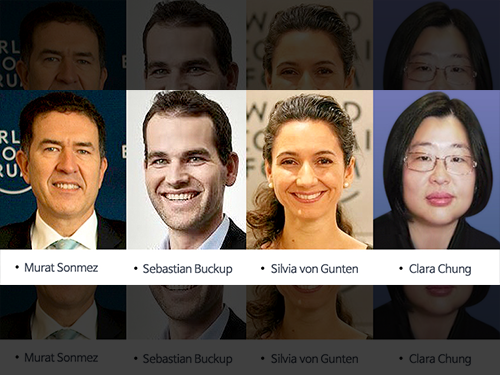 KAIST-WEF Roundtable on Inclusive Growth and Job Creation
The World Economic Forum (WEF) will join KAIST in an effort to address sweeping global problems in the wake of the Fourth Industrial Revolution. The two will co-host a roundtable on ‘Shaping Korea’s Priorities for Inclusive Growth and Job Creation in the Fourth Industrial Revolution’ on October 13 at Lotte Hotel in Seoul.
The roundtable will bring together leaders from government, industry, universities, and non-profit civic organizations to have an in-depth discussion on a thought-provoking agenda of inclusive growth and job creation which scientific and technological changes will bring about. The event will provide a platform to explore practical collaboration and innovative strategies for better job creation and innovation ecosystems.
The two will also sign an MOU for collaboration between the Fourth Industrial Revolution Information Center (FIRIC) of KAIST and the WEF Center for the Fourth Industrial Revolution (C4IR).
President Sung-Chul Shin of KAIST and the Head of the WEF Center for the Fourth Industrial Revolution, Murat Sonmez, will lead the panel discussion titled ‘Inclusive Growth and the Fourth Industrial Revolution’ which will be attended by leaders from government, industry, and non-profit civic organizations.
At the breakout sessions, the topics will be “Future Jobs” and the “Creation of Innovation Ecosystems”. Additionally, a discussion on the “SME 4.0 Initiative”, which is a program pushed forward by KAIST in collaboration with local governments, will talk about job creation through innovation in small and medium-sized enterprises (SMEs). The WEF will introduce their two-year activities and research on the Fourth Industrial Revolution, which have great potential and a high possibility of successfully undergoing the revolution, to Korea.
Since WEF Executive Chairman Klaus Schwab brought up the topic of the Fourth Industrial Revolution, the WEF has been leading agenda topics and discussions on high-profile matters, including ‘technology-driven but human-centered inclusive growth’ in predicting the future of jobs.
The WEF is a nonprofit organization committed to addressing the world’s weightiest problems. It is best known for its annual meetings in Davos, Switzerland, which attracts leaders from around the world. KAIST has been participating in this summit since 2009. President Shin will also attend the upcoming Davos summit next January. Distinguished Professor Sang Yup Lee who heads the KAIST Institute and the FIRIC is the co-chair of the Global Council on Biotechnology and a member of the Global Future Council on the Fourth Industrial Revolution at the WEF.
Moreover, President Shin and Mr. Sonmez will explain the background of the roundtable and share the results of the sessions at a joint news conference.
2017.09.28 View 10650
KAIST-WEF Roundtable on Inclusive Growth and Job Creation
The World Economic Forum (WEF) will join KAIST in an effort to address sweeping global problems in the wake of the Fourth Industrial Revolution. The two will co-host a roundtable on ‘Shaping Korea’s Priorities for Inclusive Growth and Job Creation in the Fourth Industrial Revolution’ on October 13 at Lotte Hotel in Seoul.
The roundtable will bring together leaders from government, industry, universities, and non-profit civic organizations to have an in-depth discussion on a thought-provoking agenda of inclusive growth and job creation which scientific and technological changes will bring about. The event will provide a platform to explore practical collaboration and innovative strategies for better job creation and innovation ecosystems.
The two will also sign an MOU for collaboration between the Fourth Industrial Revolution Information Center (FIRIC) of KAIST and the WEF Center for the Fourth Industrial Revolution (C4IR).
President Sung-Chul Shin of KAIST and the Head of the WEF Center for the Fourth Industrial Revolution, Murat Sonmez, will lead the panel discussion titled ‘Inclusive Growth and the Fourth Industrial Revolution’ which will be attended by leaders from government, industry, and non-profit civic organizations.
At the breakout sessions, the topics will be “Future Jobs” and the “Creation of Innovation Ecosystems”. Additionally, a discussion on the “SME 4.0 Initiative”, which is a program pushed forward by KAIST in collaboration with local governments, will talk about job creation through innovation in small and medium-sized enterprises (SMEs). The WEF will introduce their two-year activities and research on the Fourth Industrial Revolution, which have great potential and a high possibility of successfully undergoing the revolution, to Korea.
Since WEF Executive Chairman Klaus Schwab brought up the topic of the Fourth Industrial Revolution, the WEF has been leading agenda topics and discussions on high-profile matters, including ‘technology-driven but human-centered inclusive growth’ in predicting the future of jobs.
The WEF is a nonprofit organization committed to addressing the world’s weightiest problems. It is best known for its annual meetings in Davos, Switzerland, which attracts leaders from around the world. KAIST has been participating in this summit since 2009. President Shin will also attend the upcoming Davos summit next January. Distinguished Professor Sang Yup Lee who heads the KAIST Institute and the FIRIC is the co-chair of the Global Council on Biotechnology and a member of the Global Future Council on the Fourth Industrial Revolution at the WEF.
Moreover, President Shin and Mr. Sonmez will explain the background of the roundtable and share the results of the sessions at a joint news conference.
2017.09.28 View 10650 -
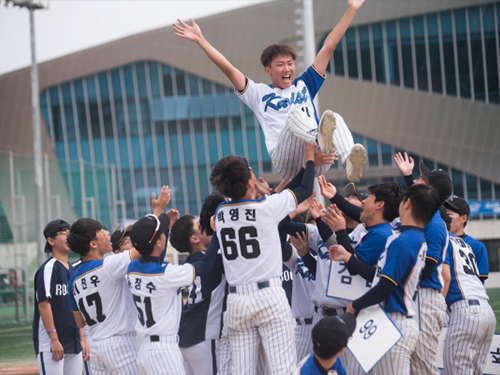 Postech-KAIST Rivalry Heats Up at the 16th Science War
The 16th Postech-KAIST Science War wrapped up its two-day rivals’ duel at the KAIST campus in Daejeon on September 23. The event was established in 2002 to build a close tie between the two renowned universities for science and technology, and to provide students with an opportunity to demonstrate their talents and abilities.
On September 21, a convoy of red Postech buses carrying more than 650 athletes, students, and supporters arrived at the KAIST campus in Daejeon. The two teams competed in eight events including both online and sports event.
The night before the actual games started, cheerleading teams from both Postech Cheero and KAIST ELKA kicked off the event.
1st Day (September 22)
The hacking tournament marked the beginning of the Science War. The event started at nine in the morning. Both teams had to solve four problems within 12 hours.
While the fierce hacking competition was underway, school music bands, including Twenties Dreams, opened up the event with beautiful voices.
The soccer game took place in the university stadium. The KAIST soccer team brought the first win to KAIST, and was their second straight victory in soccer.
At the outdoor theatre, the evening games, including Artificial Intelligence and E-sports (League of Legend) began. After the E-sports, both KAIST’s and Postech’s music and dance clubs showed amazing performances adding more excitement to the event.
Another fun aspect of the event was the ‘evening street food market’. Food trucks and food booths were lined up to satisfy students’ hunger. Talso here were various game booths such as can bowling, balloon darts, and lamp DIY.
2nd Day (September 23)
The baseball team marked the second day of the Science War in the Undergraduate Field. The KAIST team won the game by six runs.
Science quizzes sealed the Postech-KAIST Science War. Although the KAIST team led at the beginning, the Postech team overtook them by getting bonus point answers correct. This game decided Postech winning this year’s Science War.
As a spin-off, a badminton game was held in the Sports Complex and the KAIST team beat the Postech team with ease.
Last but not least, a basketball game was held in the Sports Complex. In the last game of the Science War, the KAIST team wiped away the stain of last year’s defeat.
At the closing ceremony, famous rappers and school music clubs celebrated the last moments of the Science War.
(Jiwon Hwang, Public Relations of the 16th Science War Committee)
(The 16th Science War Committee)
Cheers to the students committees, participants, and supporters who put every ounce of their effort into successfully running the 16th Postech-KAIST Science War.
Day
Category
Winner
Day 1
Hacking
Postech
Soccer
KAIST
Artificial Intelligence
Postech
E-Sports (LoL)
Postech
Day 2
Baseball
KAIST
Science Quizzes
Postech
Badminton (spin-off)
KAIST
Basketball
KAIST
(The final tally for KAIST in the Science Wars was eight wins and six losses)
2017.09.27 View 6561
Postech-KAIST Rivalry Heats Up at the 16th Science War
The 16th Postech-KAIST Science War wrapped up its two-day rivals’ duel at the KAIST campus in Daejeon on September 23. The event was established in 2002 to build a close tie between the two renowned universities for science and technology, and to provide students with an opportunity to demonstrate their talents and abilities.
On September 21, a convoy of red Postech buses carrying more than 650 athletes, students, and supporters arrived at the KAIST campus in Daejeon. The two teams competed in eight events including both online and sports event.
The night before the actual games started, cheerleading teams from both Postech Cheero and KAIST ELKA kicked off the event.
1st Day (September 22)
The hacking tournament marked the beginning of the Science War. The event started at nine in the morning. Both teams had to solve four problems within 12 hours.
While the fierce hacking competition was underway, school music bands, including Twenties Dreams, opened up the event with beautiful voices.
The soccer game took place in the university stadium. The KAIST soccer team brought the first win to KAIST, and was their second straight victory in soccer.
At the outdoor theatre, the evening games, including Artificial Intelligence and E-sports (League of Legend) began. After the E-sports, both KAIST’s and Postech’s music and dance clubs showed amazing performances adding more excitement to the event.
Another fun aspect of the event was the ‘evening street food market’. Food trucks and food booths were lined up to satisfy students’ hunger. Talso here were various game booths such as can bowling, balloon darts, and lamp DIY.
2nd Day (September 23)
The baseball team marked the second day of the Science War in the Undergraduate Field. The KAIST team won the game by six runs.
Science quizzes sealed the Postech-KAIST Science War. Although the KAIST team led at the beginning, the Postech team overtook them by getting bonus point answers correct. This game decided Postech winning this year’s Science War.
As a spin-off, a badminton game was held in the Sports Complex and the KAIST team beat the Postech team with ease.
Last but not least, a basketball game was held in the Sports Complex. In the last game of the Science War, the KAIST team wiped away the stain of last year’s defeat.
At the closing ceremony, famous rappers and school music clubs celebrated the last moments of the Science War.
(Jiwon Hwang, Public Relations of the 16th Science War Committee)
(The 16th Science War Committee)
Cheers to the students committees, participants, and supporters who put every ounce of their effort into successfully running the 16th Postech-KAIST Science War.
Day
Category
Winner
Day 1
Hacking
Postech
Soccer
KAIST
Artificial Intelligence
Postech
E-Sports (LoL)
Postech
Day 2
Baseball
KAIST
Science Quizzes
Postech
Badminton (spin-off)
KAIST
Basketball
KAIST
(The final tally for KAIST in the Science Wars was eight wins and six losses)
2017.09.27 View 6561 -
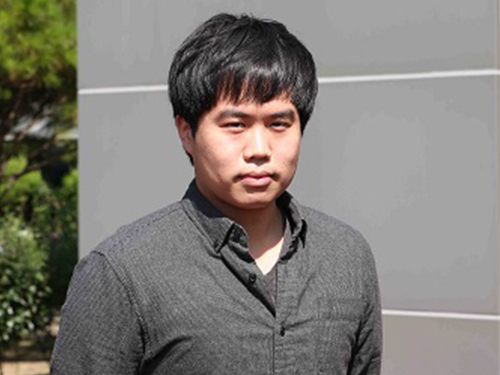 Sangeun Oh Recognized as a 2017 Google Fellow
Sangeun Oh, a Ph.D. candidate in the School of Computing was selected as a Google PhD Fellow in 2017. He is one of 47 awardees of the Google PhD Fellowship in the world.
The Google PhD Fellowship awards students showing outstanding performance in the field of computer science and related research. Since being established in 2009, the program has provided various benefits, including scholarships worth $10,000 USD and one-to-one research discussion with mentors from Google.
His research work on a mobile system that allows interactions among various kinds of smart devices was recognized in the field of mobile computing. He developed a mobile platform that allows smart devices to share diverse functions, including logins, payments, and sensors. This technology provides numerous user experiences that existing mobile platforms could not offer. Through cross-device functionality sharing, users can utilize multiple smart devices in a more convenient manner. The research was presented at The Annual International Conference on Mobile Systems, Applications, and Services (MobiSys) of the Association for Computing Machinery in July, 2017.
Oh said, “I would like to express my gratitude to my advisor, the professors in the School of Computing, and my lab colleagues. I will devote myself to carrying out more research in order to contribute to society.”
His advisor, Insik Shin, a professor in the School of Computing said, “Being recognized as a Google PhD Fellow is an honor to both the student as well as KAIST. I strongly anticipate and believe that Oh will make the next step by carrying out good quality research.”
2017.09.27 View 12869
Sangeun Oh Recognized as a 2017 Google Fellow
Sangeun Oh, a Ph.D. candidate in the School of Computing was selected as a Google PhD Fellow in 2017. He is one of 47 awardees of the Google PhD Fellowship in the world.
The Google PhD Fellowship awards students showing outstanding performance in the field of computer science and related research. Since being established in 2009, the program has provided various benefits, including scholarships worth $10,000 USD and one-to-one research discussion with mentors from Google.
His research work on a mobile system that allows interactions among various kinds of smart devices was recognized in the field of mobile computing. He developed a mobile platform that allows smart devices to share diverse functions, including logins, payments, and sensors. This technology provides numerous user experiences that existing mobile platforms could not offer. Through cross-device functionality sharing, users can utilize multiple smart devices in a more convenient manner. The research was presented at The Annual International Conference on Mobile Systems, Applications, and Services (MobiSys) of the Association for Computing Machinery in July, 2017.
Oh said, “I would like to express my gratitude to my advisor, the professors in the School of Computing, and my lab colleagues. I will devote myself to carrying out more research in order to contribute to society.”
His advisor, Insik Shin, a professor in the School of Computing said, “Being recognized as a Google PhD Fellow is an honor to both the student as well as KAIST. I strongly anticipate and believe that Oh will make the next step by carrying out good quality research.”
2017.09.27 View 12869 -
 Professor Jun Ho Oh's Total Solar Eclipse Featured in the APOD, NASA
(Professor Jun Ho Oh)
A video of a total solar eclipse, filmed in Warm Springs, Oregon by Professor Jun Ho Oh of the Department of Mechanical Engineering, was selected as the Astronomy Picture of the Day (APOD).
APOD, is a NASA website specializing in astronomy pictures. It features astronomical observations recorded by the Hubble Space Telescope or photos taken by astronomical observers from around the world.
Professor Oh is now the second Korean and the first amateur photographer whose photo was selected as the APOD.
According to the website, ‘the video frames were acquired with equipment specifically designed by Jun Ho Oh to track a close-up of the Sun’s periphery during the eclipse.’
Also, Digital Photography Review (dpreview.com) introduced observation points of the eclipse in his three-minute video, including solar prominences, corona, and Baily’s beads.
Professor Oh, the creator of the bipedal walking humanoid robot named Hubo, has been chasing eclipse since his first trip to Turkey in 1999.
“After numerous trials and failures over the last 18 years, I was finally able to capture every single breath-taking moment of the total eclipse,” said the professor.
He’s already planning for the next total eclipse in Chile on July 2, 2019.
Click the link to watch the video https://apod.nasa.gov/apod/ap170912.html
(#1 Photo of solar eclipse)
(#2 Photo of solar eclipse)
2017.09.14 View 7257
Professor Jun Ho Oh's Total Solar Eclipse Featured in the APOD, NASA
(Professor Jun Ho Oh)
A video of a total solar eclipse, filmed in Warm Springs, Oregon by Professor Jun Ho Oh of the Department of Mechanical Engineering, was selected as the Astronomy Picture of the Day (APOD).
APOD, is a NASA website specializing in astronomy pictures. It features astronomical observations recorded by the Hubble Space Telescope or photos taken by astronomical observers from around the world.
Professor Oh is now the second Korean and the first amateur photographer whose photo was selected as the APOD.
According to the website, ‘the video frames were acquired with equipment specifically designed by Jun Ho Oh to track a close-up of the Sun’s periphery during the eclipse.’
Also, Digital Photography Review (dpreview.com) introduced observation points of the eclipse in his three-minute video, including solar prominences, corona, and Baily’s beads.
Professor Oh, the creator of the bipedal walking humanoid robot named Hubo, has been chasing eclipse since his first trip to Turkey in 1999.
“After numerous trials and failures over the last 18 years, I was finally able to capture every single breath-taking moment of the total eclipse,” said the professor.
He’s already planning for the next total eclipse in Chile on July 2, 2019.
Click the link to watch the video https://apod.nasa.gov/apod/ap170912.html
(#1 Photo of solar eclipse)
(#2 Photo of solar eclipse)
2017.09.14 View 7257